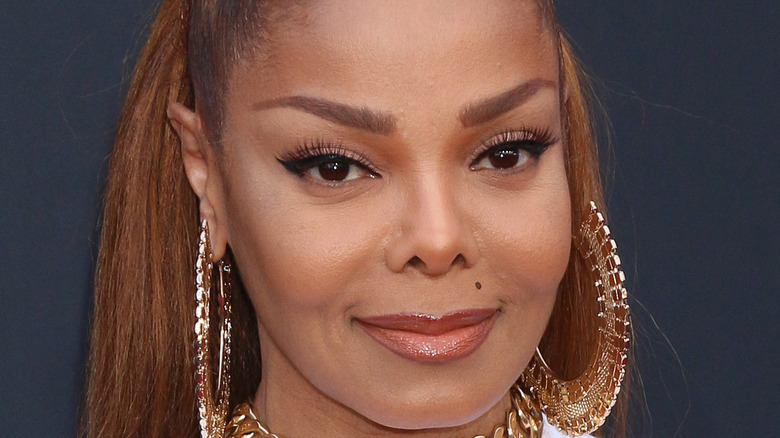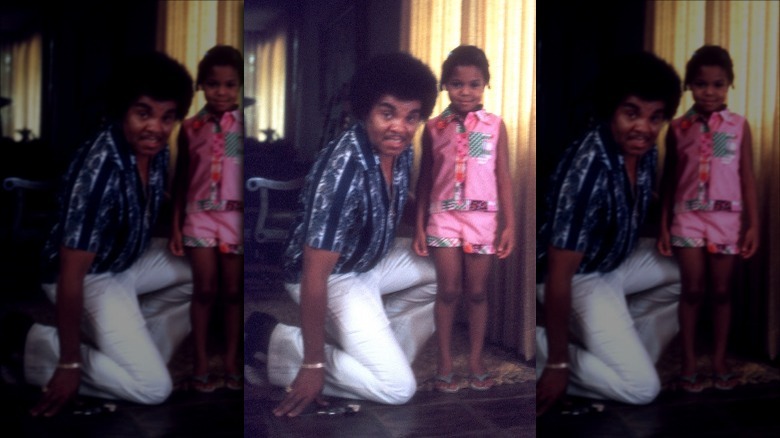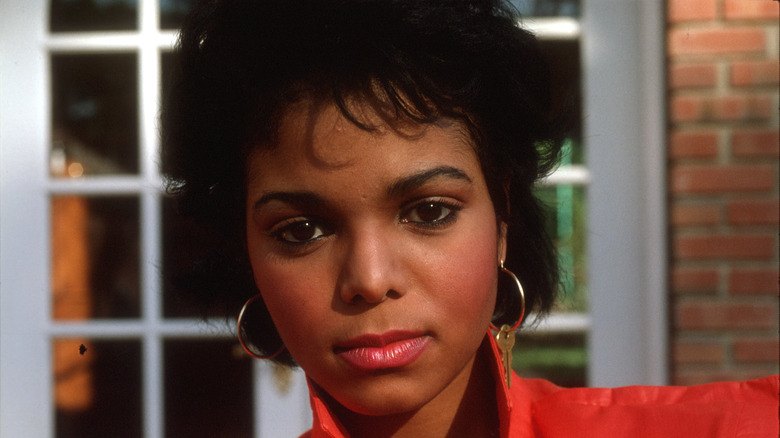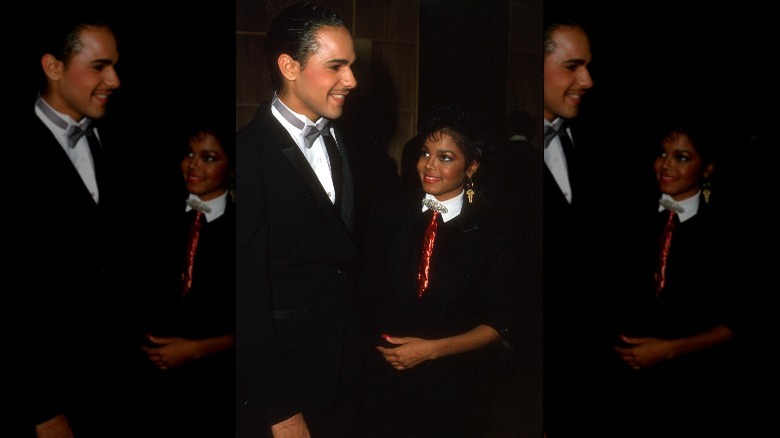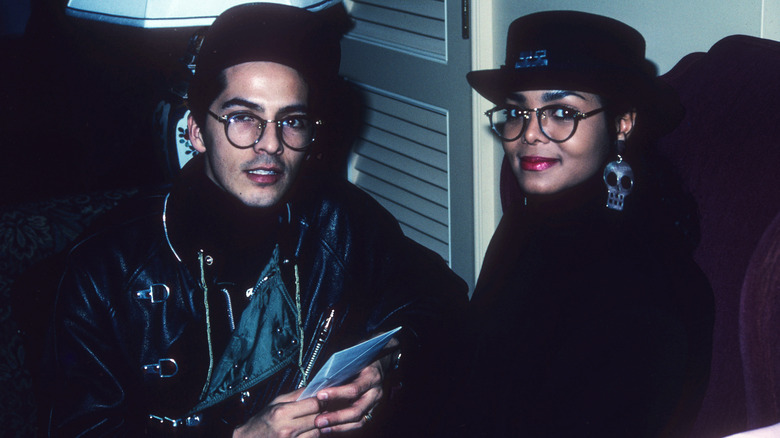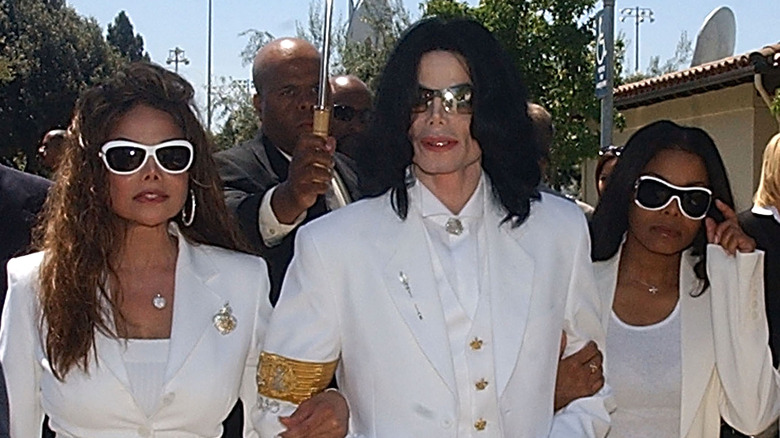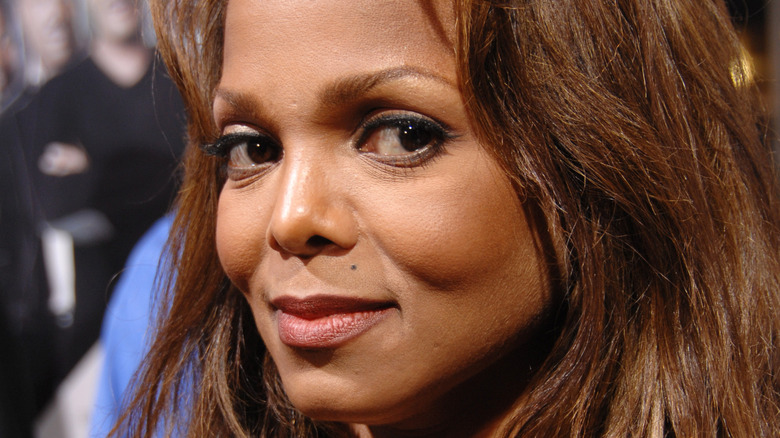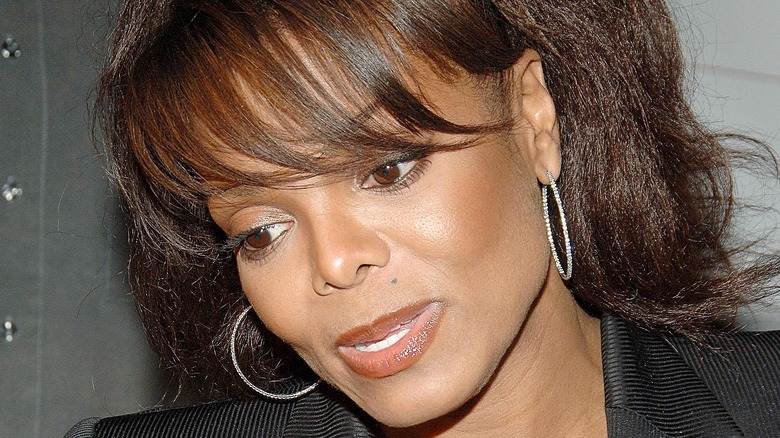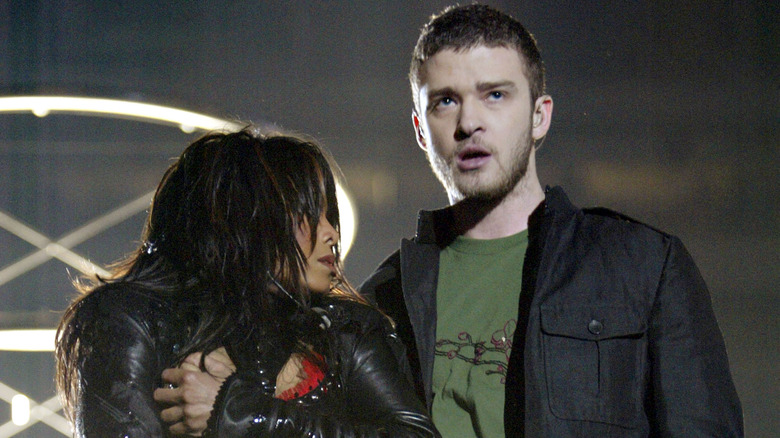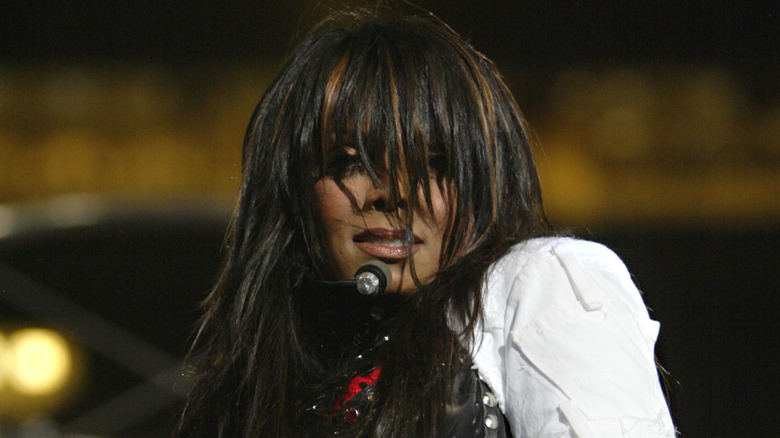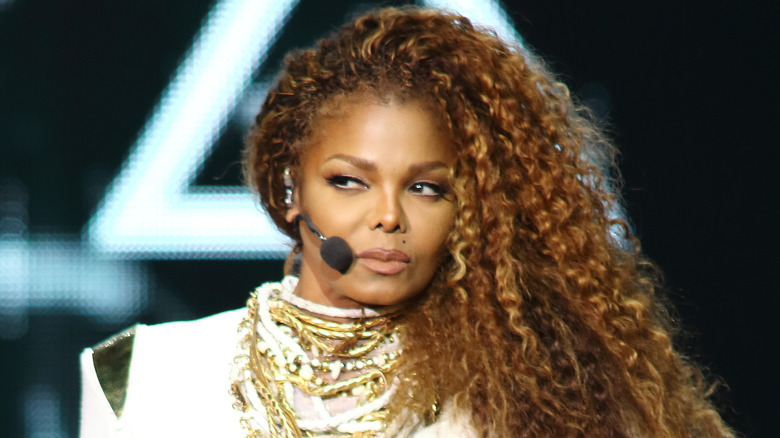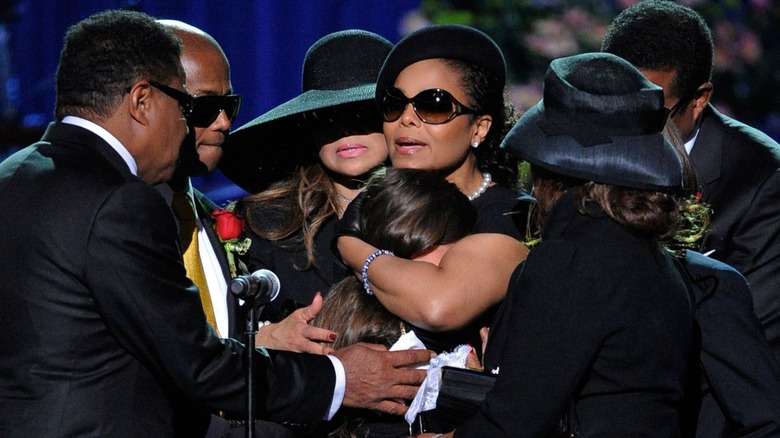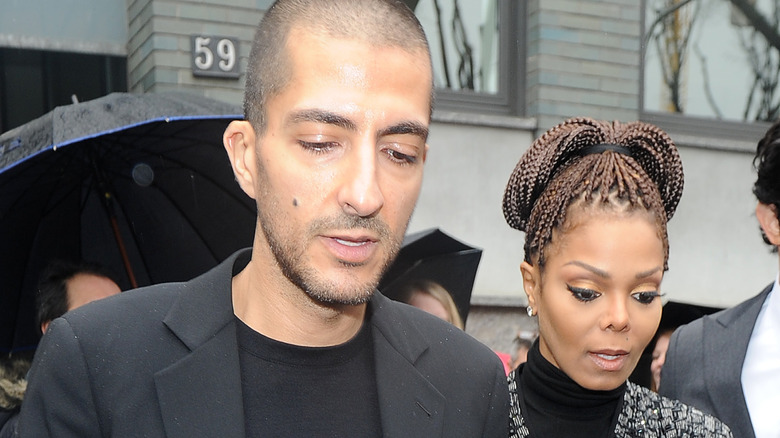Tragic Details About Janet Jackson
We may receive a commission on purchases made from links.
The following article includes mentions of mental health struggles, disordered eating, and addiction, as well as allegations of child abuse, domestic abuse, and sexual assault.
It's hard to imagine a time when the one and only Janet Damita Jo Jackson wasn't putting out hit records or dropping radio-friendly singles. The pioneering performer, along with her superstar brother, Michael Jackson, were key figures in launching MTV as a global phenomenon with their spectacular music videos in the '80s. By 1999, the Guinness Book of World Records dubbed the duo as the most successful siblings in history, per Billboard.
For her part, the "Control" singer has earned an ever-growing list of accolades that reflect her chart-topping achievements: Throughout her four-decade career, this multi-talent has received five Grammy Awards, 10 MTV Video Music Awards, and 11 Billboard Music Awards (including the Icon Award in 2018), to name just a couple dozen. Janet (or, Ms. Jackson if you're nasty ... sorry, we had to) was also up for an Academy Award in 1994 in the best original song category for "Again" — the closing tune to 1993's "Poetic Justice," in which she also just happened to star — and had previously received a star on the Hollywood Walk of Fame the same year her "Rhythm Nation World Tour 1990" became one of the most successful debut tours ever.
But this music star's outstanding legacy has also been marred by a series of devastating events that haven't always mirrored her achievements in entertainment. These are the trials, tribulations, and tragic details of Janet Jackson.
Janet Jackson's father was abusive
Janet Jackson was born on May 16, 1966 in Gary, Indiana. According to Biography, mom Katherine Jackson was a homemaker and talented singer-piano player in her own right, while dad Joe Jackson — a guitarist who once attempted a boxing career, as well as a stint in blues as part of the Falcons alongside his younger brother, Luther Jackson — worked as a U.S. Steel crane operator. Music and faith were key parts of the Jacksons' family life. But while Janet has always seemed particularly close with her mother, the pop culture icon had a very different relationship with her father.
"The sound of his car stopped us cold. We'd scatter like roaches, off to our rooms, ducking down low so as not to be visible through the windows. We didn't know what mood Joseph was bringing home," she later told Marie Claire. For most doting dads, the sound of their little girl calling them "daddy" would be enough to melt their heart, but for a young Janet and her eight older siblings, this was strictly forbidden, and he instead went by Joseph.
While Janet's late brother, Michael Jackson, often spoke out about Joe's infamous physical and emotional abuse toward him and his brothers, she revealed on "Piers Morgan Live" that her father once hit her when she was eight years old. Noting that she didn't agree with Joe's abusive parenting, Janet reflected, "I wish our relationship was different, but I know that he loves me."
If you or someone you know may be the victim of child abuse, please contact the Childhelp National Child Abuse Hotline at 1-800-4-A-Child (1-800-422-4453) or contact their live chat services.
She hated her time on Fame
In 1982, Janet Jackson released her first self-titled album, but she was much more known for her screen work. She'd warmed the hearts of millions as Penny Gordon Woods in the sitcom "Good Times," and her acting career continued to blossom with another gig on "Diff'rent Strokes." With her stunning looks and natural dance ability, it seemed only fitting that Jackson landed a role on the fourth season of "Fame." But her time on the TV spinoff of the hit '80s movie only lasted one season between 1984 and 1985, and rumors soon emerged that some members of the teen cast felt they were not treated fairly by the producers.
Though we can't confirm that allegation, Jackson candidly opened up about her short-lived experience playing aspiring dancer Cleo Hewitt during a 2012 interview with Anderson Cooper. "I didn't enjoy it at all. I didn't want to be there," she revealed. The "All For You" singer spoke fondly of her "sweet" and "lovely" castmates, but admitted that they would play "devilish" pranks on her, such as smoking marijuana outside her "bungalow" and giving her a headache, or stealing her breakfast on set.
"I was not in a great space. I was 18 — I had gone through a lot in my life," Jackson continued, noting that she was secretly married to singer James DeBarge at the time. "I was going through a lot in my marriage. ... And it was very difficult on a kid."
Janet Jackson had an annulment at age 18
When it comes to her personal life, Janet Jackson has always been notoriously private. But even her famous family were reportedly blindsided when it emerged that the 18-year-old singer-actor and 21-year-old James DeBarge, an R&B singer, had secretly wed in September 1984. Just like Jackson, DeBarge came from a large, close-knit musical family. As the seventh of 10 children born to gospel singer-songwriter Etterlene DeBarge, James and most of his siblings joined forces as DeBarge, a group known for early '80s hits like "I Like It" and "All This Love."
While James' brother, El DeBarge, told the Los Angeles Times that the couple had been "dating for two years before they got married," the union still angered both Janet's father, Joe Jackson, and record executives, who felt the elopement was in conflict with her image. In addition to pressure from her team, and her husband's struggles with drug addiction and depression, per the Daily Beast, Janet eventually filed for an annulment in November 1985.
However, rumors soon emerged that she was pregnant with their daughter and had given up the child for adoption. DeBarge himself added fuel to the fire by claiming on "Growing Up Hip Hop" in 2016 that there was indeed a secret child (via E!). However, in a 2001 interview with Vibe (via R&Being), Janet denied the allegation: "They say the kid's in Europe or that one of my brothers or sisters is raising it. But no, I've never had a child."
If you or anyone you know is struggling with addiction issues, help is available. Visit the Substance Abuse and Mental Health Services Administration website or contact SAMHSA's National Helpline at 1-800-662-HELP (4357).
If you or someone you know is struggling with mental health, please contact the Crisis Text Line by texting HOME to 741741, call the National Alliance on Mental Illness helpline at 1-800-950-NAMI (6264), or visit the National Institute of Mental Health website.
Her second husband sued her for millions
After her annulment from James DeBarge, Janet Jackson was still hopeful of settling down and having a family. She began dating her longtime friend, René Elizondo Jr. The future director and songwriter had found work as an assistant cameraman when he first met the youngest Jackson. At the time, she was around 15 or 16. But again carefully guarding her private life from her public persona, Jackson secretly married Elizondo in 1991 — she even chose not to inform her father, later telling Entertainment Weekly that "he can't keep a secret."
Elizondo went on to direct his wife in music videos like "That's the Way Love Goes" and "Together Again," and in September 1993, the hitmaker appeared topless on the cover of Rolling Stone, with the hands of her husband covering her breasts. But by January 1999, it was all over, and the pair announced in a joint statement that they were to separate. This also marked the first time it was publicly confirmed they were legally married.
Jackson's ex-husband later filed a spousal support lawsuit against her for an estimated $10 to $25 million. Maintaining in court docs that he deserved the eye-watering payout as he "contributed his skills, efforts and labour concerning her music career," according to NME, the case was eventually settled for around $10 million in 2003. Sadly, Jackson appeared devastated by the split. "I wish we could've worked it out in a totally different manner. I really do," she told Entertainment Weekly. "God knows I tried."
Janet Jackson's brother was accused of child abuse
In the early '90s, Michael Jackson's close friendships with a number of teenage boys — including screen star Macaulay Culkin — were causing many to give the King of Pop the side-eye. In August 1993, a man named Evan Chandler, the father of one of those boys, "publicly accused the 'Thriller' singer of sexually abusing his 13-year-old son, Jordan Christopher 'Jordy' Chandler," per the Mirror. While Jackson vehemently denied the allegations, the Chandlers filed a lawsuit against him that September, and the following year, the star reached a financial settlement worth an estimated $20 million with the family.
Janet Jackson supported her older brother throughout the onslaught of media scrutiny. The close siblings even sang together on the hit 1995 song, "Scream," in response to the allegations. After Santa Barbara authorities charged Michael with seven counts of child molestation in December 2003, and he again denied the allegations and pleaded not guilty, Janet remained by his side throughout the trial. In June 2005, Michael was acquitted on all counts.
In the 2009 documentary, "Michael Jackson Unmasked," Janet publicly defended her sibling. Claiming that Evan Chandler was just "after money," she defiantly said (via Newsweek), "If that was my son, I don't care if he gave me a billion dollars, I want to see you either behind bars or dead for doing that to my son." Further allegations against Michael came out in the 2019 HBO docuseries, "Leaving Neverland."
If you or someone you know may be the victim of child abuse, please contact the Childhelp National Child Abuse Hotline at 1-800-4-A-Child (1-800-422-4453) or contact their live chat services.
If you or anyone you know has been a victim of sexual assault, help is available. Visit the Rape, Abuse & Incest National Network website or contact RAINN's National Helpline at 1-800-656-HOPE (4673).
She's dealt with severe depression
In 1997, Janet Jackson released her sixth studio album, "The Velvet Rope." The ever-evolving artist had shown fans her cutesy "bubblegum pop" image with her debut and sophomore albums, but later shared a more mature and sexier feminine awakening with "Control" and "Rhythm Nation 1814." But the tone of her sixth album was remarkably different. It, of course, spawned radio-friendly hits such as "Got 'Til It's Gone" and "'Together Again," but "The Velvet Rope" also revealed Jackson's longtime struggle with depression, which was touched upon in songs like "Empty" and "I Get Lonely."
"I was very, very sad. Very down," Jackson told Newsweek about the process of making "The Velvet Rope" (via MTV News). "[I] couldn't get up sometimes. There were times when I felt very hopeless and helpless, and I felt like walls were kind of closing in on me." During a 2018 interview with Essence (via Vulture), Jackson further shared that factors like "childhood feelings of inferiority" and "societal issues of racism and sexism" compounded her depression, but added that she "found [her] way through it."
If you or someone you know is struggling with mental health, please contact the Crisis Text Line by texting HOME to 741741, call the National Alliance on Mental Illness helpline at 1-800-950-NAMI (6264), or visit the National Institute of Mental Health website.
Janet Jackson lost friends to HIV/AIDS
By the early 1980s, the HIV/AIDS crisis began to spread around the world. While first dubbed the "gay plague" due to the disease "disproportionately claiming the lives of young men in the gay community" in these early years, which initially prompted stigmatization and inaction from those in power as a result of rampant homophobia, per PinkNews, the epidemic would affect every community and creed, killing millions over the next few decades. For her part, Janet Jackson sadly lost friends to AIDS complications, but has long expressed public support for the LGBTQ+ community — including through her song, "Together Again," off her 1997 album, "The Velvet Rope."
Donating some of the tune's proceeds to the American Foundation for AIDS Research in her ongoing support for their quest to find a permanent cure, Jackson opened up about the meaning behind her eighth No. 1 single, which was "fast becoming an anthem for those suffering with AIDS, their families and friends," in a statement (via MTV News). "I believe we have other lives," she explained. "... I don't believe in the finality of death. I wanted to write about friends who have died of AIDS without being mournful or sad. ... I wanted to celebrate their spirit."
As Style explained, Jackson also sang openly about same-sex relationships and combatting homophobia on "The Velvet Rope." In addition to propelling her to the status of a bona fide gay icon, her efforts were honored in 2008, when she received the Vanguard Award at the GLAAD Media Awards.
Inside the Super Bowl halftime show controversy
When Janet Jackson was announced as the halftime show performer for the 2004 Super Bowl XXXVIII, little did she know that her performance would still be making headlines to this day. The likes of Jessica Simpson, P. Diddy, Nelly, Kid Rock, and Justin Timberlake turned out as supporting acts for Jackson — but let's face it, we only remember one. As Jackson danced seductively with Timberlake during his song, "Rock Your Body," the former NSYNC singer delivered the lyric (via Genius), "Bet I'll have you naked by the end of this song." As he sang those fateful lines, Timberlake pulled at the right side of Jackson's corset-style top — exposing her bare breast.
In a statement to E!, Jackson's rep made it clear that the "wardrobe malfunction" seen around the world was not meant to happen: "Justin was supposed to pull away the rubber bustier to reveal a red lace bra. The garment collapsed and her breast was accidentally revealed." With around 90 million people watching the Super Bowl live that night, BBC News reports that over 540,000 people complained to the Federal Communications Commission over the so-called "Nipplegate," leaving CBS to publicly apologize for the "inappropriate and unexpected" televised moment and pay out a $550,000 fine.
Janet Jackson was basically blacklisted
The fallout from the headline-making incident between Janet Jackson and Justin Timberlake at the 2004 Super Bowl halftime show was infamously unevenly placed on the former performer — and her multi-faceted career suffered for it.
Per Shadow and Act, Jackson was meant to lead a planned movie on the life of singer-activist Lena Horne, who was allegedly so outraged that she demanded the star be removed from the film. Meanwhile, Les Moonves — CBS' since-disgraced CEO and chairman at the time, who faced multiple allegations of sexual misconduct in 2018 — reportedly "banned" Jackson from the Grammy Awards that same year, per HuffPost, but allowed Timberlake to perform at the ceremony following an apology (although Jackson also publicly apologized). According to Rolling Stone, several radio stations and channels, such as MTV and VH1, stopped playing Jackson's songs and music videos, which hurt the performance "Damita Jo" — her eighth album — which dropped that April.
The woman who made a name and career for herself by churning out hit after hit for decades was basically blacklisted by the music industry. In 2021, Timberlake apologized to Jackson (and ex-girlfriend Britney Spears, but that's another story for another time) on Instagram, admitting that he'd "failed" both in moments when he "spoke out of turn, or did not speak up for what was right." Timberlake added, "I fell short in these moments ... and benefited from a system that condones misogyny and racism."
She was mocked for her weight
Janet Jackson has long been idolized worldwide for her strong physique and great smile (rapper Common and singer Robin Thicke, for example, have both named her as one of their first crushes), but the hitmaker sadly developed body dysmorphia during childhood. Noting that she began to cope by overeating, Jackson told the New York Daily News in 1998, "I'd look in the mirror and hate myself. I'd sit and cry. It was so hard for me to look at myself and find something that I liked. Not just physically, but something that was good in me."
While Jackson was only 10 when she was cast as the adorable Penny Gordon Woods on the TV show, "Good Times," she revealed in her 2011 book, "True You: A Journey to Finding and Loving Yourself," that she was told she was "fat" and needed to lose weight. Speaking with Meredith Vieira (via Reuters), she revealed how the constant ridicule she received from her older brothers — including Michael Jackson — who allegedly called her names like "horse" and "pig," fed into her insecurity over her appearance and led her to self-harm by "bang[ing] [her] head up against the wall." Previously speaking with The Telegraph in 2010, Janet noted that she'd struggled with bouts of binge-eating, bulimia, and anorexia.
Despite these brave admissions throughout her career, Janet Jackson's post-pregnancy body was cruelly scrutinized by many media outlets soon after she gave birth to her son, Eissa, in 2017.
If you are struggling with an eating disorder, or know someone who is, help is available. Visit the National Eating Disorders Association website or contact NEDA's Live Helpline at 1-800-931-2237. You can also receive 24/7 Crisis Support via text (send NEDA to 741-741).
Brother Michael Jackson died at age 50
While working on the set of Tyler Perry's "Why Did I Get Married Too?" on June 25, 2009, Janet Jackson learned of older brother Michael Jackson's untimely death at the age of 50. She'd last seen him the previous month during a huge family get together. "We had so much fun that day," Janet later told Harper's Bazaar. "We kept calling each other after and saying how great it was."
It later emerged that Michael had struggled with an addiction to narcotics — something for which the family staged multiple interventions, per CNN – and his official cause of death from an acute propofol overdose was later ruled a homicide. The drug had been improperly administered by Michael's personal physician, Dr. Conrad Murray, who was found guilty of involuntary manslaughter in 2011. For her part, Janet personally placed the blame on Murray, telling told ABC's Robin Roberts, "He was the one that was administering. I think he is responsible." Michael's memorial service was held in July 2009 at the Staples Center in Los Angeles. Fans around the world tuned in to say goodbye to the man who gave us unforgettable hits such as "Man in the Mirror" and "Billie Jean. "
"I can't describe the pain in losing our brother, or the pain of his children losing their father, or the pain of my parents in losing their son," Janet reflected in her 2011 memoir (via the New York Post).
If you or anyone you know is struggling with addiction issues, help is available. Visit the Substance Abuse and Mental Health Services Administration website or contact SAMHSA's National Helpline at 1-800-662-HELP (4357).
Janet Jackson's ugly divorce with the father of her child
After going through two difficult marriages and a heartbreaking split from her partner of eight years, Jermaine Dupri, by 2009, Janet Jackson still longed for love and had hopes of one day becoming a mother. The following year, the singer-actor had a real-life meet-cute with billionaire businessman Wissam Al Mana, who hails from Qatar, at the opening of Dubai's Armani Hotel. The duo married two years later in a private ceremony and moved to London, per Page Six, but cracks eventually started to appear in the union due to their alleged "clash of cultures," according to sources cited by the Daily Mail.
While this claim was later denied by Janet's brother, Randy Jackson, some of her prayers were answered in 2017, when the couple welcomed their first child together, a boy named Eissa, whose Arabic name translates to "savior" or "Jesus" in English. Prior to his birth, Janet told People, "We thank God for our blessing." But just four months later, she and Al Mana announced their separation. "It was quite an abusive situation," Randy alleged to the same outlet that September. "It came on later in the relationship, verbal abuse and being [made to feel like] a prisoner in her own home. No pregnant woman needs to go through being called a b**** everyday. ... That's what she went through."
Al Mana denied these abuse allegations, and the divorce resulted in a nasty custody battle over their son.
If you or someone you know is dealing with domestic abuse, you can call the National Domestic Violence Hotline at 1−800−799−7233. You can also find more information, resources, and support at their website.

